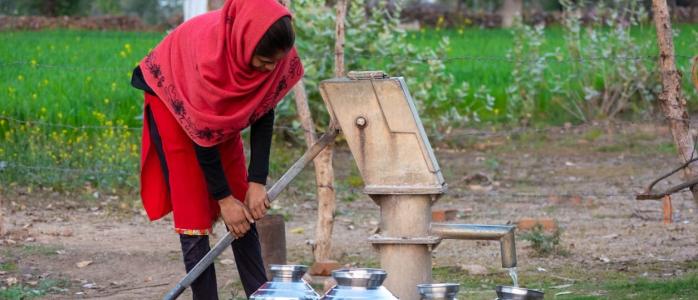



India’s water, sanitation, and hygiene—or WASH—sector has the potential to create several green jobs and uphold human health. However, these jobs are still largely unexplored despite their important contribution to people’s well-being, environmental sustainability, and socio-economic development.
Poor water and sanitation conditions impact India – in days and dollars. About 73 million working days are lost annually on account of waterborne illnesses due to unsafe sanitation practices. Further, an estimated 37.7 million people are affected by waterborne diseases annually, with 1.5 million children succumbing to diarrhoea alone. Beyond health, safe WASH is important for ensuring human dignity, enabling school attendance, and reducing healthcare expenses. Inadequate access to WASH has a disproportionately bigger impact on girls and women due to biological and cultural aspects.
There are some schemes through which jobs are currently being generated for WASH infrastructure and skill development. For instance, under the Mahatma Gandhi National Rural Employment Guarantee Act (MGNREGA) there are unskilled and semi-skilled WASH-related jobs available for asset creation. The Skill Council for Green Jobs of the Union Ministry of Skill Development and Entrepreneurship has skill development programmes for community mobilisation, construction, manufacturing, operation and maintenance, and wastewater treatment. Further, the National Health Protection Mission known as Ayushman Bharat Pradhan Mantri Jan Arogya Yojana scheme, benefits 10 crore poor and vulnerable families including informal sanitation workers. But WASH jobs have not reached the scale they can achieve, creating better health conditions and livelihoods, especially for women and girls.
These point to the need for dedicated, skilled, and sustainable employment in the WASH sector, which can be termed green jobs because they will lead to a beneficial impact on society, the economy, and the environment.
Why India must scale WASH infrastructure
The provision of safe WASH services has been linked to enhanced productivity, enabling individuals and communities to engage fully in livelihood activities, ultimately leading to higher income generation.
The availability of water supply services is essential for maintaining adequate WASH facilities. Out of a total of 10.28 lakh public schools in India, approximately 89 per cent are equipped with tap water facilities. However, it is concerning that 11 per cent of schools, a substantial portion, still lack proper water connections. More than 15,000 public schools have no toilets, which contributes to the loss of school days, especially for adolescent girls. Furthermore, about 52 per cent of the female population in India is currently of reproductive age and most of them menstruate. However, a majority of them have no access to clean and safe sanitary products. Or to a clean and private space in which to change menstrual clothes or pads. These are crucial for ensuring human dignity. UNICEF reports that a lack of safe sanitation facilities causes 25 per cent of pubescent girls in India to take time off school.
The absence of basic sanitation facilities can also degrade the environment. Without proper sanitation, human waste can contaminate the surrounding land and water sources. These contaminated water bodies can harm aquatic life, disrupt natural habitats, and compromise the quality of water available for various uses.
So, WASH-related green jobs are crucial to bridging the existing skill gap in minimising solid liquid waste, wastewater, resource waste and pollution, making WASH sector water use, and energy efficient.
The job potential of the WASH sector
According to an analysis by the Council on Energy, Environment and Water (CEEW), several government initiatives, such as Jal Jeevan Mission, Atal Mission for Rejuvenation and Urban Transformation, and Swachh Bharat Mission, are key enablers of WASH-based employment generation. These initiatives generate demand for semi-skilled and skilled jobs connected to activities in water and sanitation. These include community mobilisation and urban planning during project conception; plumbing, construction, material supply, and manufacturing, at the implementation phase; and water quality testing, water supply, wastewater treatment, and sanitation facilities operations, as a part of monitoring and operations during the management phase. They also emphasise capacity building, training, and skilling not only to create a capable workforce but also to improve the overall standard of living within communities.
Further, certain skills referring to the WASH sector have been envisioned by the Skill Council for Green Jobs for 2047, which has been established by the Union Ministry of Skill Development and Entrepreneurship. These skills—aligned with the larger objectives of the Skill India Mission and Swachh Bharat Mission—include desludging, deep cleaning of premises and sanitation facilities, wastewater treatment, septic tank cleaning, and faecal sludge treatment. Corresponding to these, there are well-developed skill development programmes for desludging operators, safai karamcharis, wastewater treatment plant technicians and helpers, septic tank technicians, and faecal sludge treatment plant O&M technicians. The target group is youth in the age group of 16-28 years.
However, to achieve the employment potential, targeted investments need to be allocated towards the WASH sector. It can also reduce economic losses incurred due to inadequate sanitation facilities, valued at approximately 7.9 per cent of India’s GDP as of 2018. The time and cost savings due to improved access translate to more person-hours spent on increasing economic productivity, securing education, and skill development. As per UNICEF estimates programmes such as Swachh Bharat Abhiyaan (Grameen) generated employment of 7.5 million Full-Time Equivalent workers by 2019, and another 5.63 million is expected to be generated by 2023-24.
A cornerstone of progress
The imperative to strengthen water, sanitation, and hygiene services is clear. Green jobs within the WASH sector emerge as a pivotal solution by creating employment opportunities for both semi-skilled and skilled workers.
The envisioned skills, as outlined by the Skill Council for Green Jobs, underscore the commitment to building a capable workforce geared towards a sustainable hygienic future. These efforts not only ensure access to decent work and social protection but also contribute significantly to SDG 10.1 – reducing inequality through enhanced income opportunities. Furthermore, the economic benefits of improved WASH services cannot be overstated. By reducing losses due to inadequate sanitation facilities and freeing up valuable time, we would catalyse productivity, education, and skill development.
But all these need targeted and consistent and consistent investments in water, sanitation and hygiene sectors. The time to act is now, for a future where safe and sustainable WASH services are not just a necessity, but a cornerstone of progress.
Upasana Negi is a Research Analyst, Suparana Katyaini is a Programme Lead, and Ayushi Kashyap is a Consultant at the Council on Energy, Environment and Water (CEEW). Send your comments to [email protected]






Add new comment